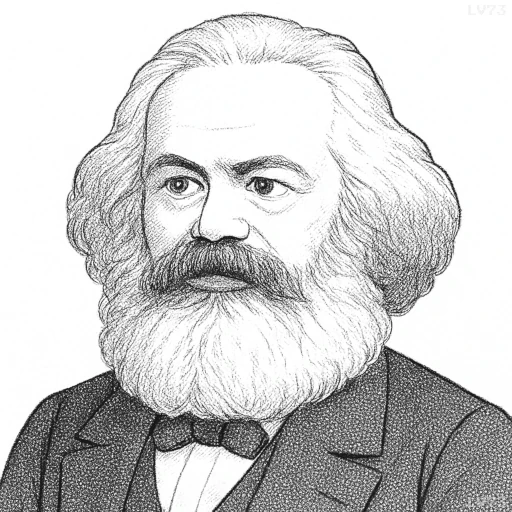“Necessity is blind until it becomes conscious. Freedom is the consciousness of necessity.”

- May 5, 1818 – March 14, 1883
- Born in the Kingdom of Prussia (Germany)
- Philosopher, economist, political thinker
table of contents
Quote
“Necessity is blind until it becomes conscious. Freedom is the consciousness of necessity.”
Explanation
In this quote, Marx explores the relationship between necessity and freedom, presenting them not as opposites, but as interconnected ideas. He argues that necessity—the constraints and conditions that shape human existence, such as economic forces, social structures, and natural laws—is “blind” because it operates outside of human awareness or control. Necessity governs much of life, but it is only when people become conscious of these forces and recognize how they influence their lives that they can begin to shape them. Freedom, according to Marx, does not mean the absence of necessity but the awareness and understanding of necessity. True freedom is achieved when people are able to recognize and understand the forces that govern their lives, and then act to transform or direct them for collective and individual benefit.
Historically, Marx believed that people under capitalism were not free because they were unaware of the economic and social forces that controlled their lives. Workers, in particular, were caught in a system where they sold their labor for wages, yet they were unaware of how their labor was exploited by capitalists. They were subject to economic necessity—such as the need to survive and earn a living—without understanding how this system worked or how they could change it. Marx believed that awareness of these conditions and the forces of class struggle was necessary for workers to achieve freedom—not in an abstract or individual sense, but as collective liberation from the exploitation inherent in capitalist systems.
In modern contexts, Marx’s idea is still relevant in discussions about social consciousness and liberation movements. Whether in movements for racial justice, economic equality, or gender rights, true freedom often begins with an awareness of the systems that perpetuate inequality and oppression. Once people understand the underlying structures of power—be it through education, organizing, or political engagement—they are in a position to change them. For example, awareness of economic exploitation, colonialism, or institutional racism is often the first step toward challenging these systems and creating social change. Marx’s quote reminds us that freedom is not merely the ability to act without constraint, but the ability to act with the full understanding of the conditions that shape our lives and to transform them for the better.
Would you like to share your impressions or related stories about this quote in the comments section?


